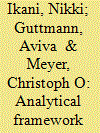| Srl | Item |
| 1 |
ID:
171230


|
|
|
|
|
| Summary/Abstract |
This paper develops a novel theoretical framework for the conduct of postmortems after major foreign policy surprises for the European Union and its member states. It proposes a taxonomy of surprise which elucidates how officials or organisations experience both sudden and slower-burning threats. It argues that foreign policy surprises in European settings require a closer look at who was surprised, in what way, and when. The paper outlines six vital performance criteria and three key attenuating factors, allowing us to better ground judgements about foreign policy performance as well as to advance realistic recommendations on how to improve.
|
|
|
|
|
|
|
|
|
|
|
|
|
|
|
|
| 2 |
ID:
106927


|
|
|
|
|
| Publication |
2011.
|
| Summary/Abstract |
The paper discusses the epistemological and normative problems arising for constructivists when attempting to forecast international events but argues that forecasting is both scientifically rewarding as well as normatively desirable. Constructivism has strengths in conceptualizing forecasting as a social activity that can shape the future itself but also weaknesses in formulating substantive mid-range theories and drawing on insights from other areas. The paper uses the debate about the European Union as an evolving military power to exemplify the normative as well as the epistemological potential of constructivist forecasting. It argues that insights from strategic culture research are particularly suited to outline trajectories of the likely when combined with the assessment of internal and external drivers of ideational and material change, the examination of discontinuities, and key uncertainties.
|
|
|
|
|
|
|
|
|
|
|
|
|
|
|
|
| 3 |
ID:
101627


|
|
|
|
|
| Publication |
2010.
|
| Summary/Abstract |
The paper takes stock of the debate about the so-called warning-response-gap regarding armed conflict within states. It argues that while the existing literature has focused strongly on "better prediction," it has neglected the analysis of the conditions under which warnings are being noticed, accepted, prioritized and responded to by policy-makers. This has led to a simplistic understanding of how communicative, cognitive and political processes involving a range of actors can influence both the perception as well as the response to warnings. The paper also criticizes that many normative judgments about the desirability of preventive action are suffering from hindsight bias and insufficient attention to balancing problems related to risk substitution, opportunity costs and moral hazard. In response to these deficits, the paper puts forward a modified model of warning as a persuasive process. It can help us to ascertain under what circumstances warning succeed in overcoming cognitive and political barriers to preventive action and to help establishing benchmarks for assessing success and failure from a normative perspective.
|
|
|
|
|
|
|
|
|
|
|
|
|
|
|
|
| 4 |
ID:
190853


|
|
|
|
|
| Summary/Abstract |
The study of why and when governments are caught out by strategic surprise has been a major occupation of intelligence studies, international relations, public administration and crisis management studies. Still little is known, however, about the structural vulnerabilities to such surprises in international organisations such as the European Union (EU). EU institutions themselves have not undertaken rigorous investigations or public inquiries of recent strategic surprises, instead relying on internal review processes. In order to understand the most common underlying problems causing surprise in the EU context, this paper adapts and tests insights from the strategic surprise literature. It elaborates a theoretical framework with five hypotheses about why the leadership of EU institutions has been prone to being caught by surprises in foreign affairs: limitations in collection capacity, institutional fragmentation of policymaking, organisational culture, member state politicisation, and cognitive biases arising from collective ideas and norms. These hypotheses are tested using a post-mortem approach investigating two significant strategic surprises: the start and spread of the Arab uprisings of 2010/11 and Ukraine–Russia crisis of 2013/14.
|
|
|
|
|
|
|
|
|
|
|
|
|
|
|
|